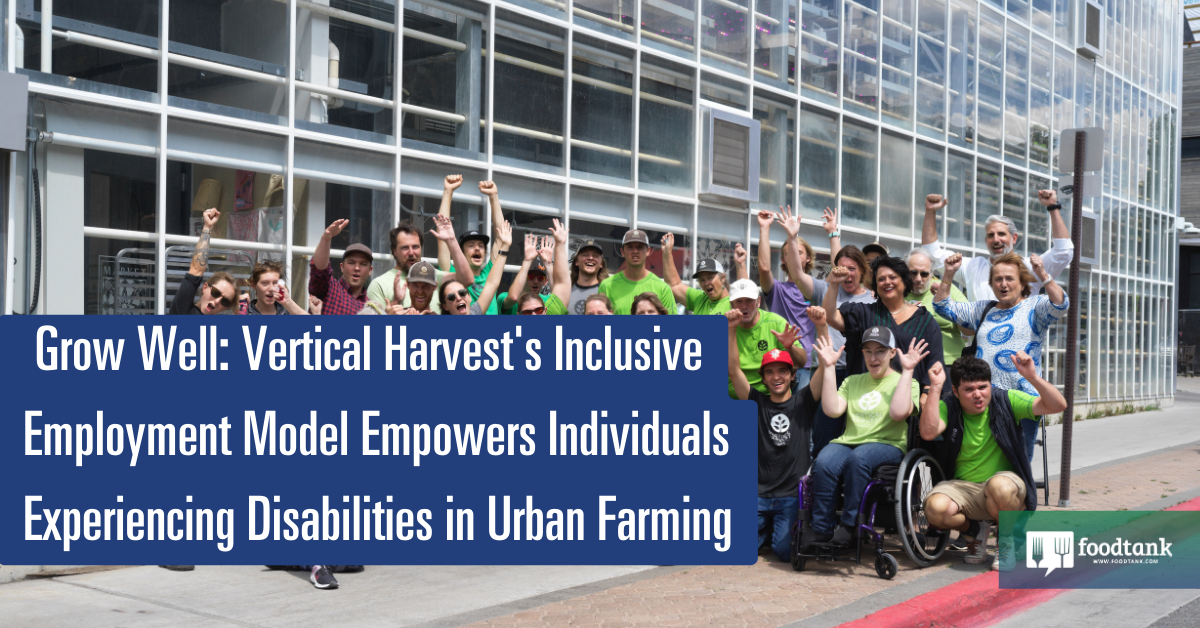Vertical Harvest is an urban hydroponic farm based in Jackson, Wyoming. It supports the community by developing a local food system, and aims to create more employment opportunities for people with developmental disabilities through its Grow Well model.
Vertical Harvest, which grows a variety of greens and lettuces, has three guiding principles that the company’s co-founder and CEO, Nona Yehia, calls “Work Good + Be Good + Do Good,” which refers to a concerted effort to prioritize workforce development, improve each employee’s personal wellness, and strengthen its position as a company that plays a positive role in the community.
The company’s mission and Grow Well model were first inspired by Yehia after he witnessed how few economic opportunities were available to his younger brother, who has a developmental disability, which prompted him and co-founder Caroline Croft Estey, a disability advocate and former case manager, to seek a more “human-centered approach” to their business, Yehia told Food Tank.
According to the ADA Participatory Action Research Consortium (ADA-PARC), in Wyoming, the unemployment rate for people with disabilities is twice that of people without disabilities.
The Grow Well model uses a multidimensional framework to address this disparity. The design emphasizes practices that improve workplace productivity while also promoting individual well-being, especially as it relates to each employee’s professional and personal growth.
“This is meant to be a bridge to adulthood with a disability, for those who need it,” Yehia told Food Tank.
Yehia said the work at Vertical Harvest is many employees’ first introduction to the complexities of vertical farming, meaning the company has a responsibility to help them build the technical skills.
She stresses that to foster a culture of inclusion and equity, it’s important to “customize each person’s role to their current situation, agree on any accommodations or supports employees may need, and then plan for areas where you want to grow in the future.”
The Grow Well model also focuses on individual wellness. “We start by looking at the social determinants that impact an individual, if they are from a marginalized community, and assess what kind of support the employee needs,” Yehia says. “We focus on self-reflection and listening and learning from different perspectives.”
Yehia believes that over the company’s eight-year history, she has witnessed the positive impact that customized hiring can have on an individual level: “We prove every day that companies that prioritize diversity are better companies in everyone’s eyes,” she tells Food Tank.
Vertical Harvest plans to expand with two new locations: Westbrook, Maine, and co-founder Nona Yehia’s hometown of Detroit, Michigan.
These expansions will increase the Westbrook facility’s production capacity by 15 times compared to the Jackson facility and are expected to operate at much higher levels.
“Our building is a bright, beautiful beacon in the heart of our community, signaling that we care about where our food comes from, the people who grow it, and that the health and abundance of our community matters and should include everyone, especially those on the margins,” Yehia says. “Health and humanity are what connect us, and food is one of the most fundamental expressions of both.”
Articles like the one you just read are made possible by the generous support of Food Tank members. Join our growing work by clicking here to become a member today.
Photo courtesy of Vertical Harvest

